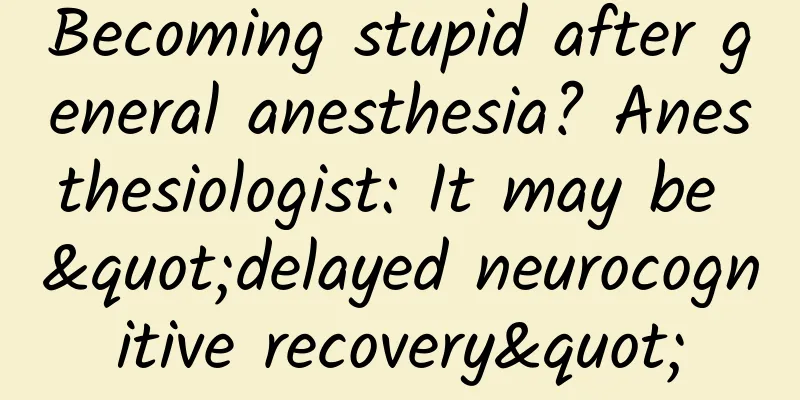Becoming stupid after general anesthesia? Anesthesiologist: It may be "delayed neurocognitive recovery"

|
When anesthesiologists conduct preoperative visits, they often hear patients say, "Doctor, I don't want general anesthesia. After general anesthesia, I will become stupid and my memory will decline." Why do patients become stupid after surgery? This is delayed neurocognitive recovery (dNCR). The perioperative cognitive work expert group describes all cognitive changes after surgery and anesthesia as "perioperative neurocognitive disorder", including a variety of clinical symptoms: POD (postoperative delirium), delayed neurocognitive recovery (dNCR), postoperative neurocognitive disorder, etc. Delirium is a potentially reversible, acutely manifesting disorder characterized by impaired neuropsychological functions, such as attention and cognitive processing, and is the most common complication after surgery and anesthesia in the elderly. Clinical manifestations include acute delirium, hallucinations, disorientation, inappropriate behavior, impaired speech, and transient memory loss. Postoperative delirium (POD) can manifest in the early stage of anesthesia recovery (called postoperative delirium without lucid intervals), late stage (postoperative delirium with lucid intervals), or during postoperative hospitalization. According to clinical observation, its fluctuations may occur particularly in the early morning, evening, and night. Delayed neurocognitive recovery (dNCR) is a clinical condition that may persist during the first month after surgery and includes complications of intellectual function, cognitive difficulties, attention problems, subjective cognitive problems, and memory deficits. When these clinical symptoms persist for more than one month after surgery, they are called mild or severe postoperative neurocognitive dysfunction (NCD), with an estimated duration of 30 days to 12 months. Any significant cognitive impairment after one year is simply classified as mild or severe NCD, including dementia (severe NCD) and mild cognitive impairment (mild NCD). Next, let us use a case to have a clearer understanding of delayed neurocognitive recovery (dNCR). The patient was a 52-year-old female, 156cm tall, 62kg in weight, with primary school education, ASA grade II. She was diagnosed with common bile duct stones and residual gallbladder stones before surgery. It was planned to undergo laparoscopic resection of the residual gallbladder + common bile duct incision to remove stones. There was no special preoperative examination. The test results showed elevated transaminase and total bilirubin levels were higher than normal. There was no special condition and she was healthy in the past. Anesthesia induction and intraoperative operation were stable. The operation lasted 3 hours. Half an hour after the operation, consciousness and breathing were restored. She could respond to calls. The endotracheal tube was removed. When the patient was prepared to be sent back to the ward after half an hour of observation, the patient was conscious and could answer questions, but she said she didn't know many questions. She didn't know her name, how old she was, where she was, and she didn't know the names and relationships of her family members. She didn't know what the doctor did for a job. She could perform limb activities according to instructions. Perioperative neurocognitive dysfunction was considered. After communicating with the attending physician, she was sent back to the ward and given olanzapine orally. On the 6th day after surgery, the patient's memory recovered and cognitive function returned to normal. Delayed neurocognitive recovery (dNCR) is a clinical condition that may persist within the first month after surgery and includes intellectual function complications, cognitive difficulties, attention problems, subjective cognitive problems, and memory deficits, which reduces patient autonomy and quality of life, prolongs patient hospitalization, increases patient medical burden, and has a serious impact on patients and their families. What causes patients to experience delayed neurocognitive recovery (dNCR) after surgery? 1. Age is the only definite risk factor for PND in clinical practice. The older the patient is, the more likely they are to have perioperative cognitive dysfunction. 2. Low education level has been identified as a risk factor; 3. The impact of anesthesia and surgery on PND is not clear, which may be related to different anesthesia methods and types of surgery. Other risk factors such as gender, preoperative self-care ability, hearing and vision status, drug history, intraoperative hemodynamic changes, etc. may be related to the occurrence of PND, but the conclusion is not clear yet. How to prevent and treat postoperative cognitive dysfunction? 1. Preoperative optimization, psychological counseling, nutritional support, necessary medication adjustments, and optimal internal environment and mental and physical condition of patients can reduce the risk of PND. Limiting prolonged perioperative fasting and dehydration is key, which can be controlled by allowing clear fluids 2 hours before surgery and immediately after surgery. 2. Preoperative evaluation and development of detailed perioperative management plans for high-risk patients. 3. Timely functional training after surgery, such as patient movement and exercise, cognitive stimulation, regulation of circadian rhythm, vision and hearing aids, nursing staff education, and timely removal of the catheter. 4. Achieving optimal pain control with non-opioid analgesics and regional block techniques is critical. 5. It is recommended to avoid excessive use of medications, especially anticholinergics and benzodiazepines for perioperative use. 6. If non-pharmacological treatments are not feasible, pharmacological treatments with a focus on symptomatic treatment are recommended; there is evidence that low-dose olanzapine and quetiapine have potential benefits for elderly patients with PND. 7. Dexmedetomidine can significantly reduce the incidence and severity of POD in elderly patients. Delayed neurocognitive recovery (dNCR) can reduce patients' independence and quality of life and prolong hospital stay, especially for elderly patients. Perioperative care should include comprehensive prevention strategies before, during and after surgery to reduce the incidence and duration of delayed neurocognitive recovery (dNCR), but this requires close collaboration among multiple disciplines to significantly improve patients' prognosis and long-term quality of life. Let us work together to pay attention to the health of the elderly! Li Kezhi, Anesthesiology Department, Sichuan Provincial Armed Police Corps Hospital [Warm Tips] Follow us, there are a lot of professional medical knowledge here, revealing the secrets of surgical anesthesia for you~ |
>>: This heart indicator often appears abnormal, but it may not be a heart disease
Recommend
Does drinking brown sugar water work for anemia? How to tell whether brown sugar is real or fake
Brown sugar is warm in nature and sweet in taste....
Symptoms of impaired renal function in women
As a urinary organ in the human body, the kidney ...
What causes chest pain in girls?
Girls will start to grow and develop when they re...
What does the uterus look like?
The uterus is a muscular, thick-walled cavity wit...
Is surgery necessary for hydrosalpinx?
The occurrence of hydrosalpinx indicates that the...
What should I do if I have sex one week after a cervical biopsy?
Among female gynecological diseases, the most ser...
Why do pregnant women have swollen legs and feet?
Pregnancy is a very difficult process. Pregnant w...
What should I pay attention to when taking out the fertility ring?
Many families use IUDs as the main method of cont...
What to do if you have hyperthyroidism during pregnancy
Pregnant women are a special group. If a woman de...
Treatment of vulvar itching
For female friends, the most troublesome thing is...
How to maintain after hysterectomy?
In recent years, there have been more and more di...
How to determine whether the gestational sac is expelled
Under normal circumstances, women who want to hav...
The difference between the dark area in the uterus and the gestational sac
Generally speaking, pregnancy is an extremely hap...
Can I check my menstrual flow by checking six hormones?
Women's menstrual period comes for a few days...
Can I eat sweet potatoes during my period?
Women during menstruation are prone to various pr...









